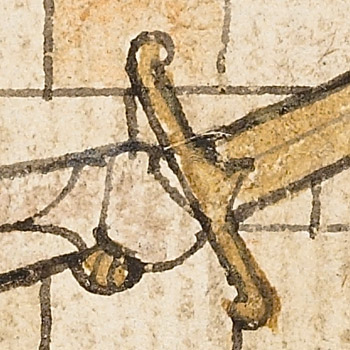Floris and Blancheflour
General Information
Plot Summary

[The king of Spain captures a Christian noblewoman, who gives birth to a daughter, Blancheflour, on the same day as his queen bears a son, Floris. The children are raised together]. When they are seven, Floris refuses to begin school without Blancheflour. The pair studies together for five years and their love blossoms. Fearing that they will marry, the King decides to execute Blancheflour. His queen persuades him to send Floris away instead, hoping that the separation will dull their love.
While he is away, Floris ignores his studies and becomes lovesick. The King resolves to kill Blancheflour but is again dissuaded by his wife. Instead, they sell her to some merchants in exchange for gold and an ornate cup, once owned by Aeneas and decorated with scenes of Paris and Helen of Troy. The king erects a false tomb, and when Floris returns he is told that Blancheflour has died and been buried. He laments wildly and tries to kill himself, until his mother confesses and the empty tomb is opened. Floris vows to seek Blancheflour and his parents give him the cup and a magic ring for protection. He dresses as a merchant and lodges at an inn, where he learns that Blancheflour has been taken to Babylon. He rewards his hosts richly and sets sail the next day.
When he arrives, Floris stays in another inn and learns that the emir plans to keep Blancheflour in his harem. The innkeeper sends the youth to his friend Dares, who warns him that the emir’s women are kept in an impenetrable tower, an architectural marvel. He also explains how the emir uses enchantments and a magical garden to select his brides. Floris swoons, but Dares has an ingenious plan: Floris should pretend to be a mason and befriend the tower’s porter, ensuring his loyalty by letting him win his ornate cup in a game of checkers.
The porter places Floris in a basket of flowers and sends him into the tower, where he is discovered by Blancheflour’s friend Clarys. She agrees not to betray them and the reunited couple go to bed. Blancheflour misses an appointment with the emir, but Clarys makes excuses for her. When it happens a second time, however, his chamberlain discovers her in bed with Floris. Enraged, the emir imprisons the lovers.
When they are brought before the emir’s barons to be judged, Floris tries to give Blancheflour his magic ring, but she refuses and it falls to the floor. The barons are moved by their beauty, but the emir demands they be killed, until a king, who saw them arguing over the ring, persuades him otherwise. Floris is spared in exchange for revealing how he entered the tower; the barons laugh at his story and the delighted Amir knights him. The lovers are married, and the emir marries Clarys. Shortly after, news reaches Floris that his father has died, and he and his bride return to Spain, where they are crowned.
From: Jennifer Fellows, Of Love and Chivalry: An Anthology of Middle English Romance. London: J.M. Dent for Everyman, 1993.
Manuscript: London, British Library MS Egerton 2862
Manuscripts
Click a title below to search for all romances in that manuscript.